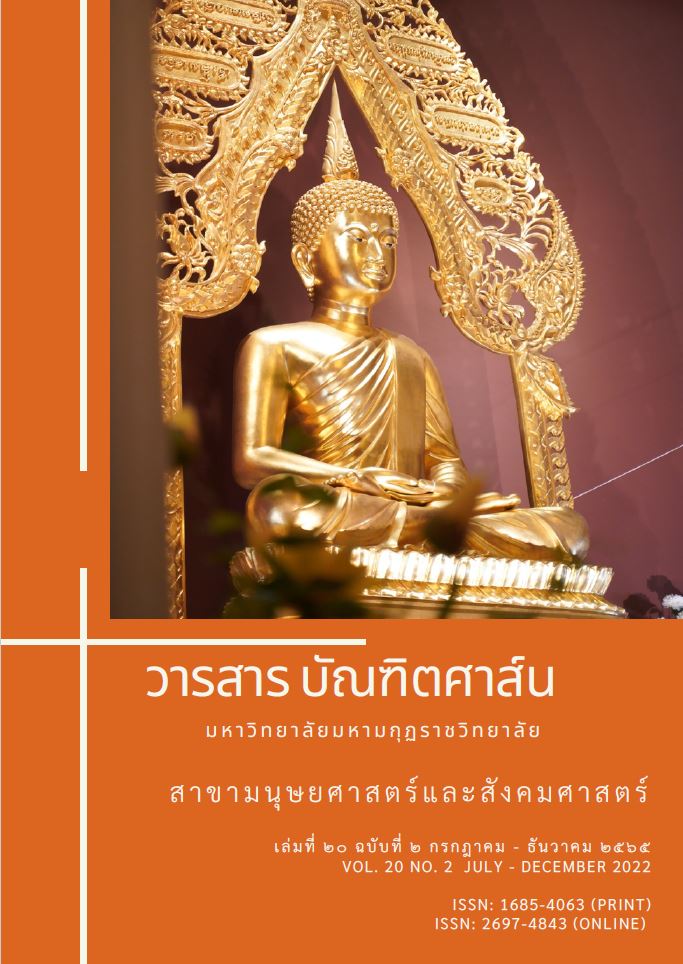การเสริมสร้างการพัฒนาความสามารถในด้านปัญญาและด้านอารมณ์ด้วยหลักพุทธธรรม
คำสำคัญ:
การสร้างเสริมพัฒนาความสามารถ, ปัญญา, อารมณ์, หลักพุทธธรรมบทคัดย่อ
ดุษฎีนิพนธ์นี้ มีวัตถุประสงค์ดังนี้ 1. เพื่อศึกษาการเสริมสร้างการพัฒนาความสามารถในด้านปัญญาและอารมณ์ 2. เพื่อศึกษาหลักพุทธธรรมเกี่ยวกับการเสริมสร้างการพัฒนาความสามารถในด้านปัญญาและด้านอารมณ์ 3. เพื่อบูรณาการการเสริมสร้างการพัฒนาความสามารถในด้านปัญญาและด้านอารมณ์ด้วยหลักพุทธธรรม 4. เพื่อนำเสนอแนวทางและการสร้างองค์ความรู้ใหม่เกี่ยวกับ “รูปแบบการบูรณาการการเสริมสร้างการพัฒนาความสามารถในด้านปัญญาและด้านอารมณ์ด้วยหลักพุทธธรรม” เป็นงานวิจัยเชิงคุณภาพ มีการสัมภาษณ์เชิงลึกผู้ทรงคุณวุฒิ 16 รูป/คน
ผลจากการวิจัยพบว่า :
- การเสริมสร้างการพัฒนาความสามารถในด้านปัญญาและด้านอารมณ์ทฤษฏีตะวันตก ด้านปัญญามีการพัฒนาตามความเหมาะสมในแต่ละช่วงวัย ด้านอารมณ์ มีการเรียนรู้จักอารมณ์ของตนเอง และผู้อื่น ปรับตนเองและประพฤติปฏิบัติต่อตนเองและผู้อื่นอย่างถูกต้องเหมาะสม
- หลักพุทธธรรมการเสริมสร้างการพัฒนาความสามารถในด้านปัญญาใช้ ภาวนา 4 และโยนิโสมนสิการ ด้านอารมณ์โดยใช้ กัลยาณมิตร จริต 6 สัปปายะ 7
- 3. วิธีบูรณาการนำแนวคิดในการเสริมสร้างการพัฒนาความสามารถในด้านปัญญาและด้านอารมณ์ตามแนวทฤษฏีตะวันตก บูรณาการกับหลักพุทธธรรม ผลคือแนวทฤษฏีตะวันตก มีความสอดคล้องกันกับหลักพุทธธรรมในที่สุด
4. เมื่อบูรณาการแล้วได้รูปแบบ MODEL การสร้างเสริมพัฒนาความสามารถในด้านปัญญาและอารมณ์ด้วยหลักพุทธธรรม ได้แก่ “MEW MODEL” Morality หมายถึง คุณธรรมภายในเป็นสัมมาทิฏฐิ Ethics หมายถึง จริยธรรม มีการประพฤติปฏิบัติอย่างถูกต้องเหมาะสม Wisdom หมายถึง ปัญญา มีหลักวิธีการคิดและการปฏิบัติที่ถูกต้อง
เอกสารอ้างอิง
มหามกุฏราชวิทยาลัย. (๒๕๔๖). พระไตรปิฎกภาษาไทยและอรรถกถาแปล. นครปฐม : โรงพิมพ์มหามกุฏราช
วิทยาลัย.
กรมสุขภาพจิต. คู่มือความฉลาดทางอารมณ์ (ฉบับปรับปรุง). กรุงเทพมหานคร : สไตล์ครีเอทีฟเฮ้าส์, 2551.
กมลรัตน์ เหล้าสุวงษ์. จิตวิทยา. กรุงเทพมหานคร : สำนักพิมพ์ศูนย์ส่งเสริมวิชาการ. 2528.
ขุนสรรพกิจโกศล (โกวิท ปัทมะสุนทร). คู่มือการศึกษาพระอภิธรรม ปริจเฉทที่ 7. กรุงเทพมหานคร :
โรงพิมพ์มหาจุฬาลงกรณราชวิทยาลัย, 2534.
จอง พีอาเจต์ (Jean Piaget) อ้างถึงใน พรรณทิพย์ สิริวรรณบุษย์. ทฤษฎีจิตวิทยาพัฒนาการ.
กรุงเทพมหานคร : สำนักพิมพ์แห่งจุฬาลงกรณ์มหาวิทยาลัย, 2547.
ทองสุข ทองกระจ่าง. อภิธรรมโชติกะวิทยาลัย และสมถกรรมฐาน. (พิมพ์ครั้งที่ 3). กรุงเทพมหานคร :
มูลนิธิเผยแผ่พระสัทธรรม, 2551.
นายแปลก สนธิรักษ์. พจนานุกรมบาลี-ไทย. (พิมพ์ครั้งที่ 2). กรุงเทพมหานคร : บริษัทอมรินทร์พริ้นติ้ง, 2532.
บาร์ออน, อ้างถึงใน กรมสุขภาพจิต. คู่มือความฉลาดทางอารมณ์ฉบับปรับปรุง. กรุงเทพมหานคร :
สไตล์ครีเอทีฟเฮ้าส์, 2551.
บ.สยังวสี เจ้าของ เจโตวสีภิกขุ. อริยุปวาท เล่ม 2 ฉบับปรับปรุง. กรุงเทพมหานคร : บริษัท วิชั่น พรีเพรส จำกัด. 2558.
รศ.ดร.อารี พันธ์มณี. (2554) การพัฒนาความคิดสร้างสรรค์, กรุงเทพมหานคร : สำนักพิมพ์แมคจำกัด.
ดาวน์โหลด
เผยแพร่แล้ว
รูปแบบการอ้างอิง
ฉบับ
ประเภทบทความ
สัญญาอนุญาต
ลิขสิทธิ์ (c) 2022 มหาวิทยาลัยมหามกุฏราชวิทยาลัย

อนุญาตภายใต้เงื่อนไข Creative Commons Attribution-NonCommercial-NoDerivatives 4.0 International License.
บทความวิชาการและบทความวิจัยในวารสารฉบับนี้ถือเป็นความรับผิดชอบของผู้เขียนเท่านั้น บทความที่ได้รับการตีพิมพ์ในวารสารบัณฑิตศาส์น ถือเป็นลิขสิทธิ์ของมหาวิทยาลัยมหามกุฏราชวิทยาลัย ตามพระราชบัญญัติลิขสิทธิ์



